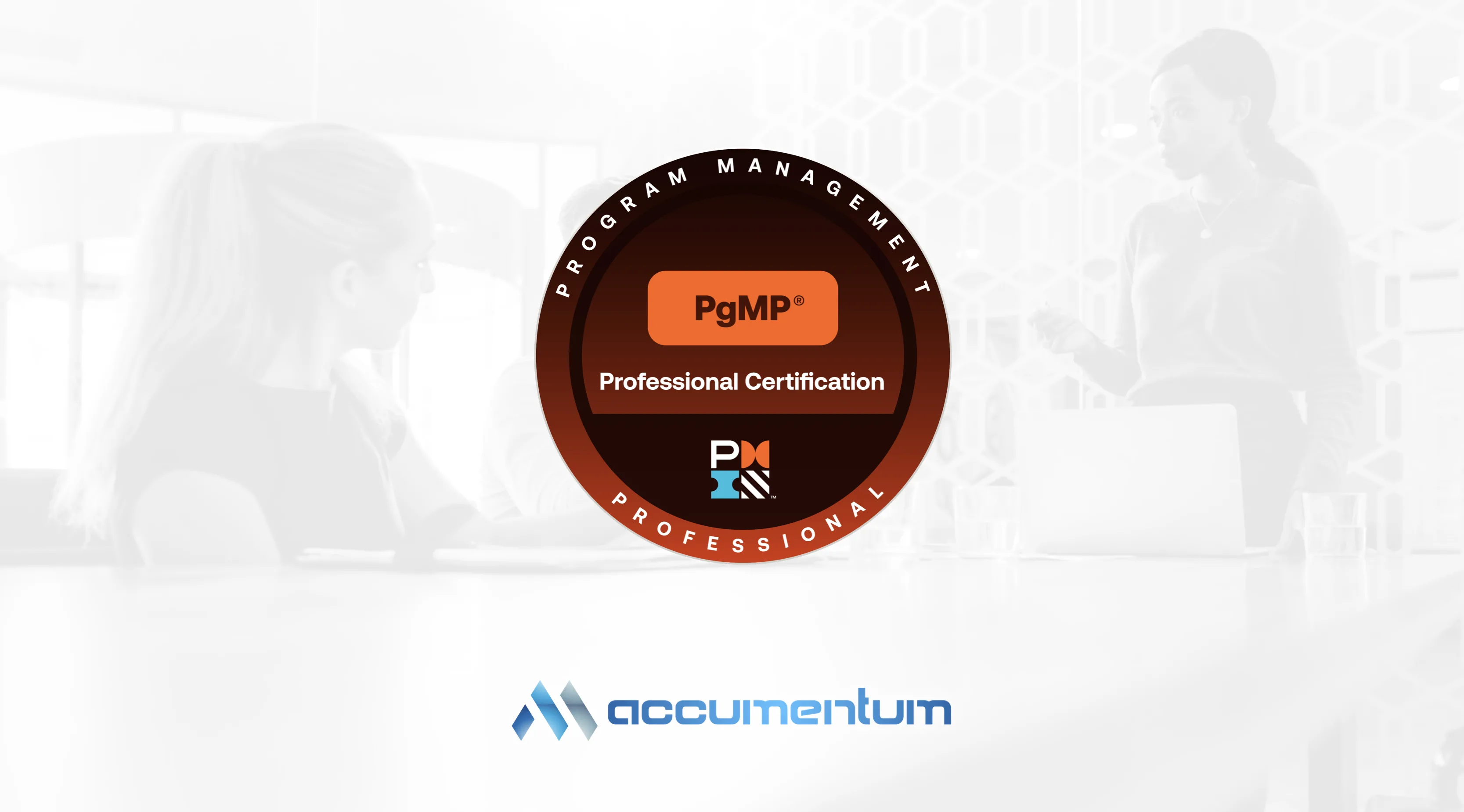PMI Program Management Professional (PgMP)® Training Course
Course Overview
The Program Management Professional (PgMP)® Training Course with Accumentum is structured to offer a holistic understanding of program management principles as defined by the PMI. The training begins with an introduction to program management, detailing its importance in achieving organizational strategy and benefits management. Key modules include strategic program management, governance, stakeholder engagement, and benefits delivery. Participants will explore how to align multiple projects within a program to meet business goals, manage risks at a program level, and navigate organizational change. The course employs a blend of interactive lectures, case studies reflecting real-world scenarios, and group activities to foster practical application of concepts. It also includes exam preparation strategies, with mock tests to familiarize learners with the (PgMP)® certification exam format. This comprehensive overview ensures that by the end of the course, participants are well-prepared to tackle the complexities of program management in their professional environments.

Course Objectives
- Grasp the foundational concepts, frameworks, and methodologies of program management according to PMI’s standards.
- Learn how to align programs with organizational strategy, manage benefits realization, and drive value delivery throughout the program lifecycle.
- Master techniques for effective stakeholder identification, analysis, and engagement to ensure program success.
- Develop skills in establishing program governance, managing risks, and ensuring compliance with organizational policies and standards.
- Equip participants with the knowledge, exam strategies, and practice needed to successfully pass the PMI’s Program Management Professional (PgMP) certification exam.
Who Should Attend
- Individuals with extensive experience managing multiple projects who are looking to transition into program management roles.
- Current program managers aiming to validate their skills, gain formal recognition, or enhance their understanding of PMI’s program management standards.
- Executives overseeing project portfolios who wish to optimize program management practices within their organizations.
- Management consultants specializing in project or program management who seek to broaden their expertise and credentials in line with PMI standards.
- Leaders who are involved in strategic decision-making and want to understand how program management can drive organizational change and success.
Prerequisites
- A minimum of four years of project management experience, with at least four years dedicated to program management.
- A secondary degree (high school diploma, associate’s degree or global equivalent) is required, or a bachelor’s degree can reduce the experience requirement by one year.
- Completion of 6,000 hours of program management experience, or 9,000 hours if you hold a secondary degree, within the last 15 years.
- At least 6,000 hours of leading and directing projects, which can overlap with the program management hours.
- Familiarity with PMI’s standards, including the PMI’s Program Management Standard, and a commitment to adhere to the PMI Code of Ethics and Professional Conduct.
Course Content
- Understanding how to align program goals with organizational strategy.
- Developing a clear program vision and mission statement.
- Identifying and aligning stakeholder expectations with program objectives.
- Relating program management to portfolio management for strategic alignment.
- Techniques for identifying and defining program benefits.
- Crafting plans to ensure benefits are realized.
- Methods to track and adjust benefits delivery.
- Ensuring benefits are sustainable post-program.
- Tools for mapping and understanding stakeholder influence.
- Developing strategies for effective stakeholder communication.
- Techniques to manage and resolve conflicts among stakeholders.
- Addressing stakeholder resistance and facilitating change.
- Establishing effective governance frameworks.
- Understanding decision rights and accountability.
- Ensuring the program complies with organizational and regulatory requirements.
- Managing governance risks within the program.
- Techniques to start a program effectively.
- Developing comprehensive program plans.
- Managing program execution and resource allocation.
- Best practices for program closure and transition.
- Identifying potential risks at the program level.
- Assessing the impact and likelihood of risks.
- Developing strategies to mitigate or capitalize on risks.
- Continuous monitoring and adaptation to emerging risks.
- Defining quality metrics for the program.
- Ensuring program processes meet quality standards.
- Monitoring program outputs for quality compliance.
- Implementing lessons learned for future quality enhancements.
- Forecasting resource needs across the program.
- Strategies for obtaining necessary resources.
- Managing resources efficiently among projects.
- Techniques to maximize resource use and minimize waste.
- Crafting a communication strategy tailored to program needs.
- Effective methods for disseminating information.
- Reporting program status to stakeholders.
- Overseeing and adjusting communication channels and messages.
- Creating a financial plan for the program.
- Estimating program costs accurately.
- Tracking financial performance against the budget.
- Ensuring financial resources deliver maximum value.
Course Features
Interactive Learning
Engage with expert instructors and peers through training sessions, discussions, and practical exercises.
Comprehensive Study Materials
Access extensive resources, including e-books, video lectures, and practice exams.
Real-World Applications
Work on real-life case studies and scenarios to apply Program Management concepts.
Certification Preparation
Receive guidance and tips to successfully pass the PgMP® certification exam.
Certification Exam
Upon completing the Program Management Professional (PgMP)® Training Course with Accumentum, you will be thoroughly prepared to take the PgMP certification exam. This certification validates your foundational knowledge of program management principles, PMI's standards for program management, and operational practices, demonstrating your capability to align programs with strategic business objectives, manage complex stakeholder relationships, and effectively utilize best practices for program governance and benefits realization. Achieving the PgMP certification will notably enhance your career path, positioning you for roles that demand strategic oversight of multiple projects and leadership in managing large-scale organizational initiatives.
Enrollment
Enroll in the Program Management Professional (PgMP)® Training Course with Accumentum to elevate your program management knowledge to a professional level and earn a respected credential. This course is your pathway to becoming a certified program management professional according to PMI standards. For detailed information and to secure your spot, visit Accumentum's registration page linked below.
